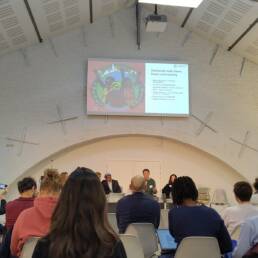Caritas Europa joins numerous other civil society organisations in expressing grave concern over the direction of the EU’s international cooperation. The recently leaked draft Briefing Book from the European Commission department for international cooperation lays out its vision which is primarily based on the EU’s economic interests.
The leaked briefing addresses two main concerns: the fear that the EU is not competitive in the global area and the EU’s economic interests (in particular, securing access to raw materials and green hydrogen outside Europe). It makes it clear that all bets are on the Global Gateway, the EU’s strategy for major investments abroad, mainly through cooperation with the private sector. The briefing thereby also makes it clear that the EU’s development cooperation should primarily help “create market opportunities” for European businesses, in blatant contradiction with its purpose of eradicating poverty and reducing inequalities in the Global South and at odds with EU Treaties.
This strategy is going in the wrong direction. It does not live up to EU self-proclaimed values of equality and human rights or to its 2030 Agenda and climate commitments, and it leaves no space for any sincere concern for our planet or any real preoccupation about those furthest behind.
Maria Nyman, Caritas Europa Secretary General
Moreover, it is unlikely to succeed in addressing the EU’s concerns about its political standing in the world, for it is silent on the major priorities of partner countries, failing to engage with them on equal footing.
The EU’s strategy is “driven by economic interests”, but people in partner countries want environmental protection and human rights to take precedence over corporate interests. The strategy, designed to secure raw materials needed for the EU’s green transition, is also likely to come down to the import of partner countries’ unprocessed minerals, when what these partners seek is the possibility to utilise their own resources to industrialise and build up their manufacturing capacities.
Another incoherence is that The EU’s strategy replicates the destructive model of the fossil fuel sector, increasing the extractive industry in the Global South, primarily for the sake of meeting Europe’s taken-for-granted, ever-growing energy demand. But what Global South leaders have been demanding is for the EU to act upon its greater responsibility to address the current climate emergency, including by reducing its energy consumption.
Finally, the EU’s strategy regards partner countries as “Emerging Markets and Developing Economies”, but people in partner countries would benefit instead from a human rights-based approach in which the EU puts their health, education and social protection at the forefront of its international cooperation.
An inward-looking EU that dismissed partner countries’ priorities by, for example, supporting the inequitable distribution of COVID-19 vaccines, by applying double standards in its approach to refugees fleeing from Ukraine, and by wanting to contain migration into Europe at all costs, has already eroded its relations with partner countries, especially in Africa. And yet, the new strategy fails to learn from these shortcomings and make a fair offer. Such an approach further exposes that the EU is withdrawing from its commitment to human rights and only increases the risk for the EU to be sidelined in the changing “established international order”.
The EU can be a more reliable partner to the Global South only if it stops using partnerships to, first and foremost, fulfil its own interests, if it lives up to its proclaimed values and if it delivers on the commitments made in terms of financing for human development and climate goals.
Lucy Esipila, Caritas Africa Regional Coordinator
Moreover, the focus on the EU’s own immediate interests and the mentality of competition ignores the fact that everything and everyone is interconnected. It is an illusion to believe that by abdicating from its leadership in standing for human rights and fighting against climate change worldwide, the EU will somehow become a safer and better place to live in than it is today.
This strategy is not a win-win for all involved, and it is not even a winner-take-all approach in which the EU thrives at the expense of partner countries. In this short-sighted strategy everyone loses. The briefing shows a lack of vision for a post-2030, post-extractivist future in which everyone – Europeans and non-Europeans alike – can be safe and live a good life. This cannot be what the new European Commission wants to be about.
More information
Luísa Fondello
International Cooperation Officer
Tel: +32 (0)2 235 03 93
lfondello@caritas.eu




